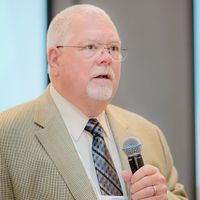
Bob McIntosh
Global Industries
Enviro-Energy Solutions
Collaborators
Tags
Talent ShortageUPM Community Event Series – Facility 2.0: Webinar #2 – Expertise in Semiconductor Facilities Operations
May Community Event recap
Share this insight
In preparation for the UPM 2022 Annual Conference, UPM has launched a Community Event series: ‘Deconstructing the Challenges of Facility 2.0’. The series’ second webinar – ‘Expertise in Semiconductor Facilities Operations’ – focused on challenges related to the shortage of expertise across the supply chain and how the industry can collaboratively work towards solutions. Bob McIntosh (Enviro-Energy Solutions) moderated the panel, which included speakers Elizabeth Betancourt (Intel), Niall Maher (SCREEN), Dan Wilcox (Page) and Kenneth Sullivan (Arizona State University). Read the takeaways below, or view the event recording here. Why is the expertise shortage a problem? The deficit of trained staff across the entire semiconductor supply chain is related to unprecedented industry transformations:
- Demand for semiconductor chips has spurred a construction boom. Facilities therefore require more direct employees and indirect employees, such as field service engineers. Moreover, the clustering of new industrial facilities in certain regions is further tightening competition for talent.
- The step function higher complexity of devices is resulting in greater manufacturing complexity and material purity requirements. As device complexity accelerates, different technologies and systems are often introduced which are more difficult to operate and require constant new learning for engineers.
- Due to increasing manufacturing complexity, engineers often become niche experts in system operations, making it difficult to transfer between disciplines without significant retraining.
- Supply chain pressures necessitate the expansion of the entire supply base to meet demand. Tool and technology suppliers want to ramp up production of materials, equipment and sub-components, but cannot find staff to run additional manufacturing capacity.
The expertise shortage is expected to persist for at least five years, in line with fab construction ramp-up. As new engineering graduates may undergo at least three to five years of training to become competent in running a system, the industry must find innovative solutions for the expertise shortage. What expert skills are in short supply? While companies across the supply chain are experiencing skill shortages in all areas, Community Event speakers highlighted a few key constraints:
- Elizabeth Betancourt, Operations and Commissioning Manager at Intel, emphasized the importance of facilities engineers specializing in gases, hydrogen generation, power and life safety. Particularly in demand are staff able to troubleshoot systems and use model-based problem solving. Betancourt estimates the Intel Ocotillo campus facilities will require 180 personnel in general facilities roles in the next 1.5 years.
- Dan Wilcox, Principal – Director Process Engineering at Page, underscored the need for chemical and gas process engineers. In addition, the growing importance of data integration in facilities necessitates engineers skilled in advanced Building Information Modeling (BIM). Wilcox said the industry must put such digital modeling expertise on the curriculum to prepare for greater demand in coming years.
- Niall Maher, Engineering Manager at SCREEN SPE USA, said he must hire three or four engineers for product or process engineering, but also requires 30-40 more technicians in the coming years.
How can the industry find solutions to the expertise shortage? Part of the solution lies in raising employee retention rates by making facilities roles interesting and challenging. Without overworking employees, companies must also consider how to increase the productivity of the current pool of engineers. Finally, collaboration across the industry supply chain is paramount for overcoming the expertise shortage. Facilities often look to third-party expertise to overcome complex system difficulties. Betancourt explained that in the long-term, equipment providers can help alleviate the expertise strains faced by facilities. “Vendors and suppliers often provide training that is crucial for the understanding and development of training,” she said. “We connect with them to ensure we integrate their training with ours.” How can the industry provide training programs? The industry must prioritize funding for training programs, something which often does not happen during periods of cost-cutting. The industry could also lobby for governmental subsidies – such as those outlined in the CHIPS Act – to dedicate a greater portion to training programs for young engineers. The US currently has very few dedicated training programs for semiconductor facilities management compared to the pharmaceuticals and petrochemicals industries, from which new engineer hires may come. Developing a professional training program will require a robust assessment for engineers entering the industry so they understand key technical skills. Development of a training There are benefits and drawbacks of different learning modalities while teaching adults: learning alongside a cohort proven to be effective for knowledge sharing, while the flexibility of self-paced online courses allow a wider range of audience to be reached. Mentorships also benefit the industry, improving retention and providing critical knowledge transfer. A limited number of programs in US focus on facilities. Some programs highlighted in the event include:
- Construction and facility management programs from Arizona State University
- Water treatment training services from DHP
- Coming soon: UPM University, which will provide training delivered by experts on ultrapure water and wastewater management for the semiconductor industry.
To learn more about how the industry is tackling the expertise shortage, view the event recording here.
Share this insight
Related insights
How is the semiconductor industry tackling the challenges of the expertise shortage?

Georgia Bottomley
Global Water Intelligence
Year in review: Fab announcements in 2022

Orla McCoy
Global Water Intelligence
Facility 2.0: Are We Ready?

Orla McCoy
Global Water Intelligence